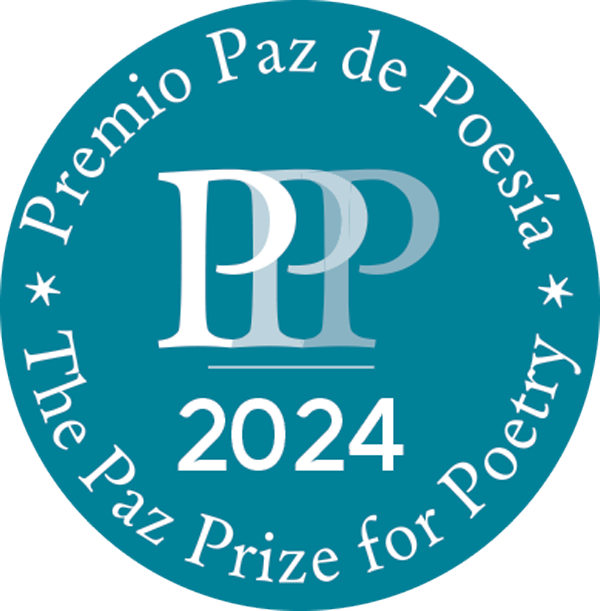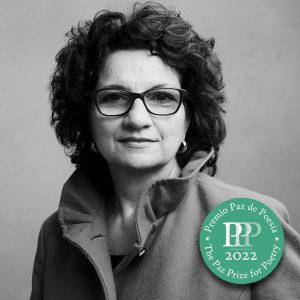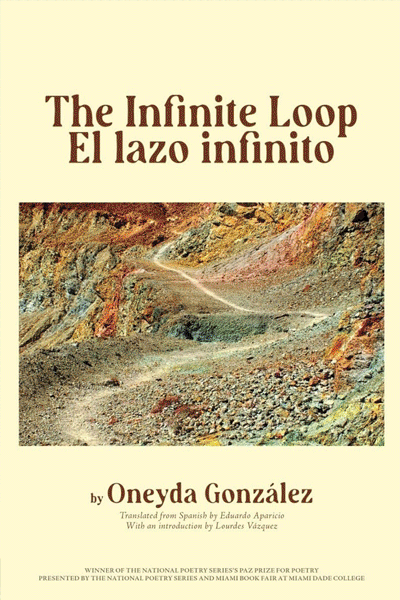The Miami Book Fair at Miami Dade College, in collaboration with The National Poetry Series, offer the biennial award Paz Prize for Poetry.
Named in honor of the late Nobel Prize-winning poet, Octavio Paz, the award recognizes a previously unpublished poetry book written in Spanish by a poet residing in the U.S. The Prize recognizes book-length manuscripts of poetry written in Spanish. The winning work is translated into English and published in a bilingual edition by the prestigious independent publisher Akashic Books, and its author receives a $2,000 cash prize.
More than 500 poets from across the U.S. have entered the literary contest in the past. In addition to the cash prize, winners are invited to read at Miami Book Fair, and have the opportunity to present their books at other events throughout the country.
The next submission period will open on May 1st, 2024 and will end on June 15th, 2024.

Winner of the 2022 Paz Prize for Poetry
Miami Dade College’s (MDC) acclaimed Miami Book Fair, in collaboration with the National Poetry Series, is pleased to announce the 2022 Paz Prize for Poetry winner: Cuban poet Oneyda Gonzalez for her manuscript El lazo infinito. Gonzalez’s book, selected by judge Lourdes Vazquez, will be published in an English and Spanish bilingual edition by the prestigious independent publisher Akashic Books.
The biennial Paz Prize for Poetry, launched in 2012, is named in honor of the late Nobel Prize-winning poet Octavio Paz, and recognizes a previously unpublished poetry book written in Spanish by a poet residing in the U.S.
 Oneyda Gonzalez the winning poet for the 2022 edition was born in Camagüey, Cuba, Gonzalez has previously published La ciudad promisoria and El camino de Bárbara (poetry). Her texts appear in the anthologies Mujer adentro and Catedral sumergida. In 2003 she published the book of narratives Las cinco y una noches, and coordinated the compilation Escrito sobre un rostro, about Severo Sarduy, to whom she returned in Seres en el borde (2007). Polvo de alas. El guión cinematográfico en Cuba (2009) brings together her interviews with critics, directors and screenwriters of Cuban cinema. In 2010, Cuentos claros is published, while she was working on the documentary project Severo Secreto, which was awarded the “Amigos de la Biblioteca de Princeton” Research Grant in 2015. Her most recent publication is Una biografía coral sobre Severo Sarduy, Ediciones Rialta, 2022. Gonzalez has a master’s degree in Latin American culture.
Oneyda Gonzalez the winning poet for the 2022 edition was born in Camagüey, Cuba, Gonzalez has previously published La ciudad promisoria and El camino de Bárbara (poetry). Her texts appear in the anthologies Mujer adentro and Catedral sumergida. In 2003 she published the book of narratives Las cinco y una noches, and coordinated the compilation Escrito sobre un rostro, about Severo Sarduy, to whom she returned in Seres en el borde (2007). Polvo de alas. El guión cinematográfico en Cuba (2009) brings together her interviews with critics, directors and screenwriters of Cuban cinema. In 2010, Cuentos claros is published, while she was working on the documentary project Severo Secreto, which was awarded the “Amigos de la Biblioteca de Princeton” Research Grant in 2015. Her most recent publication is Una biografía coral sobre Severo Sarduy, Ediciones Rialta, 2022. Gonzalez has a master’s degree in Latin American culture.
“I am very excited that the Miami Book Fair’s Paz Prize for Poetry has been awarded to my book El lazo infinito,” Gonzalez said when receiving the news. “Writing a book is a learning process, and it is very nice to see that it is received with affection. I feel that the Paz Prize seeks to expand links between the many cultures that coexist in this country by offering the opportunity for Latino writers’ texts to be read in both languages.”
“There was strong competition, but El lazo infinito stands out for its unique inner depth,” Vazquez said of the winning manuscript. “In a kind of introspective scenario —a movie theater— a poem begins the rite and as a voice, an ‘I’ (that personal identity) in continuous dialogue with her inner voice. That never-ending reflection creates a universe of revelations, desires, and knowledge, and its course diverge, intermingle, and grow like the stems of a plant.”
The finalists for the 2022 edition of the Paz Prize for Poetry were: Giancarlo Huapaya, Andrea Cote Botero, Edgar Galeano, Carlos Aguasaco, Elidio La Torre Lagares, Leon Felix Batista, Manuel Lopez, Claudia Noguera Penso, Ena Ruiz, Rosie Inguanzo, Melanie Márquez Adams, Lila Zemborain, Douglas Gómez Barrueta, Keila Vall de la Ville, Luis Correa-Díaz, Noraya Ccoyure, Mike Hernández y Lionel Valdivia.
The entry period for the 2024 Open Competition begins on May 1, 2024 and runs through (and including) June 15, 2024.
Eligible poets include:
- U.S. Citizens
- Residents of the United States for a ten-year period prior to January 1 of the prize year, or
- Deferred Action for Childhood Arrival (DACA) status, Temporary Protected Status (TPS), Legal Permanent Status (LPS), or any subsequent categories designated by the U.S. authorities as conferring similar enhanced status upon non-citizens living in the United States.
- The entry period for the 2024 Open Competition begins on May 1, 2024 and runs through (and including) June 15, 2024
All manuscripts must be previously unpublished in their complete form, although some or all of the individual poems may have appeared in periodicals.
Translations, chapbooks, small groups of poems, and self-published books are not eligible.
Manuscript length is not limited. However, a length of 48-64 pages is suggested.
Manuscripts must be paginated and contain a Table of Contents.
Because all submissions are anonymously submitted, and must be preserved as such until the end of the contest, please observe the following: The cover page of the manuscript should list the title of the manuscript only. No personal information of any kind, including name, address, phone number or email address should appear anywhere within the manuscript. All contact information will be entered separately in the entrant’s Submittable account. Any manuscript containing personal information will not be considered for review.
Please also do not include: Acknowledgments, explanatory statements, resumes, autobiographical statements, photographs, illustrations, or artwork.
A list of previous publications or appearances in periodicals should not be included.
When saving manuscripts, entrants should not “name” the manuscript with their last name in their personal computer storage, as that will appear when the reader opens the manuscript. For example: John Smith should not save his manuscript as “Smith_Poetry _Manuscript.doc.”
No additions, deletions, or substitutions are allowed once a manuscript has been submitted. Entrants should inform NPS immediately if their manuscript is selected for publication elsewhere.
Finalists for the award will be notified in mid September, and the winner will be announced in November. Information relating to the competition will be available at nationalpoetryseries.org and miamibookfair.com.
Finalists for the award will be notified in mid September, and the winner will be announced in November. Information relating to the competition will be available at nationalpoetryseries.org and miamibookfair.com.
Germán Guerra: Poetry Contest Judge

In 2022, Cuban poet Oneyda González was awarded the Paz Prize for Poetry, for her manuscript The Infinite Loop/El lazo infinito. The book, selected by judge Lourdes Vázquez, was translated by Eduardo Aparicio, and published in a bilingual, English and Spanish, edition by Akashic Books.
“I am very excited that the Miami Book Fair’s Paz Prize for Poetry has been awarded to my book El lazo infinito. Writing a book is a learning process, and it is very nice to see that it is received with affection. I feel that the Paz Prize seeks to expand links between the many cultures that coexist in this country by offering the opportunity for Latino writers’ texts to be read in both languages.”
In 2020, Mexican-American poet Alejandro Pérez-Cortés was awarded the Paz Prize for Poetry, for his manuscript Ima y Coli son el árbol que nunca fue semilla / Ima and Coli: The Tree That Was Never a Seed. The book, selected by judge José Kozer, was translated by writer and editor Sean Manning, and published in both English and Spanish by Akashic Books.
“I am honored to be the first Mexican immigrant (and a son of Colima) to be recognized in this way. My manuscript: Ima and Coli: The Tree That Was Never a Seed / Ima y Coli el árbol que nunca fue semilla is my own genesis and chronology of Colima. I want to express my gratitude to poet José Kozer, the National Poetry Series, and the Miami Book Fair for taking pride in spreading the voices of the Spanish speaking poets of the United States.” –Alejandro Pérez-Cortés
In 2018 the Paz Prize was awarded to Puerto Rican poet Johanny Vázquez Paz for her manuscript I Offer My Heart as a Target / Ofrezco mi corazón como una diana, which was chosen by judge and renowned poet Rigoberto González.
Cuban author Legna Rodríguez Iglesias was the winner of the third edition of the Paz Poetry Prize in 2016. Legna Rodríguez Iglesias manuscript, Miami Century Fox was chosen by Achy Obejas and was just translated by Eduardo Aparicio and published by Akashic Press.
“Legna Rodriguez Iglesias Miami Century Fox is a delightful, seductive read,” Obejas said. “Sonnets? Rhyme and meter? Yes, along with a delicious serving of irony and wit. This is one very smart collection of poems, a loving and also sly portrait of Miami and of the immigrant experience in the 21st century.”
The second winner of The Paz Prize for Poetry is Carlos Pintado, for his collection Nueve Monedas/Nine Coins, chosen by judge Richard Blanco.
“The stories of America’s diverse cultural landscape don’t come in just one language or one color. The Paz Prize recognizes this,” said Blanco. “This important award bridges understanding through the power of poetry, and honors the value of Spanish-speaking cultures contributing their stories through the arts to the story of the United States.”
The first winner of the award was Dinapiera Di Donato for her collection, Colaterales, chosen by the prize’s inaugural judge, Victor Hernandez Cruz.

Germán Guerra was born in Guantánamo, Cuba, in 1966. He is a poet, photographer, journalist and editor. He has resided in Miami since 1992. He has published Dos poemas (1998), Metal (1998), Libro de silencio (2007), Oficio de tinieblas (2014), Nadie ante el espejo (2017), Hijos (2019) and Los espejos Los sueños La muerte (2020). Several of his poems were included in Reunión de ausentes: Antología de poetas cubanos (1998), a book that has a prologue by him; His texts also appeared in Island of My Hunger: Cuban Poetry Today (2007), in Antología de la poesía cubana del exilio (2011) and in 13 Poetas (2017). His most recent book: Los espejos Los sueños La muerte (2023, Colección Piedra de Sísifo), brings together a set of short stories where he recreates some of the imperfections of humanity.